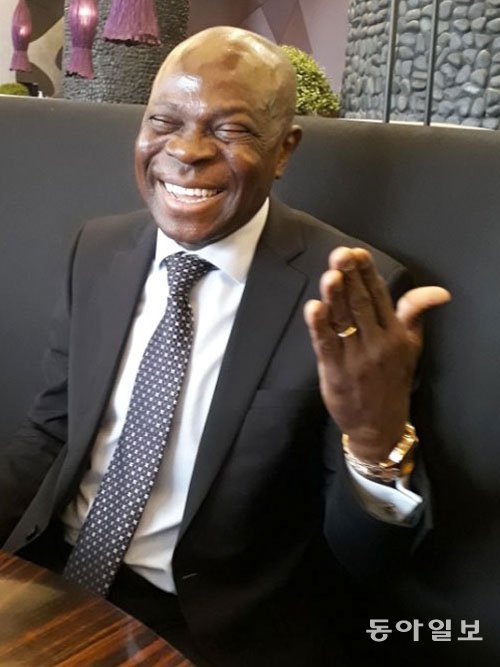IFAD chief says S. Korea’s ICTs are helping low-income countries
IFAD chief says S. Korea’s ICTs are helping low-income countries
Posted May. 14, 2018 07:29,
Updated May. 14, 2018 07:29

“South Korea’s mobile phones are helping to develop rural areas in South Asian countries such as Bangladesh and Cambodia,” said Gilbert F. Houngbo, the president of the International Fund for Agricultural Development (IFAD), a specialized agency of the United Nations.
South Korea’s information and communications technologies are playing an important role in supporting developing countries in the field of international agricultural development, the IFAD chief told The Dong-A Ilbo in an interview that took place in central Seoul last Friday. Conventional wisdom has it that development aid is done by providing farming machines and subsidies, or transferring agricultural techniques, however he emphasized that new communications technologies, notably mobile phones from South Korea, a global ICT powerhouse, are transforming lives in rural areas. The IFAD chief came to Seoul to attend an international ODA forum for sustainable development here and to talk over agricultural cooperation with Korean government officials as the country is a key contributor among the member countries. The former prime minister of Togo has been serving as the sixth president of the development agency since April 2017.
South Korea joined the UN’s specialized institution dedicated to supporting agricultural development in low-income countries in 1978 and is a leading contributor among top 20 donor countries. The country is currently funding IFAD-supported projects to provide technical assistance to low-income countries. “Digital technology allows farmers in India to check weather forecasts with their mobile phone so that they are prepared against natural disasters,” said the IFAD chief. “In Cambodia, farmers use a mobile application called farm site map, which gives information on soil, weather conditions, and prevention measures, contributing to greater productivity in Cambodia.”
Eun-A Cho achim@donga.com



![[김순덕의 도발] ‘李부터 연임’ 개헌, 이 대통령은 가능성을 말했다](https://dimg.donga.com/c/138/175/90/1/wps/NEWS/IMAGE/2026/01/16/133172656.1.jpg)

![“설거지해도 그대로”…냄비 ‘무지개 얼룩’ 5분 해결법 [알쓸톡]](https://dimg.donga.com/c/138/175/90/1/wps/NEWS/IMAGE/2026/01/15/133164664.3.png)

